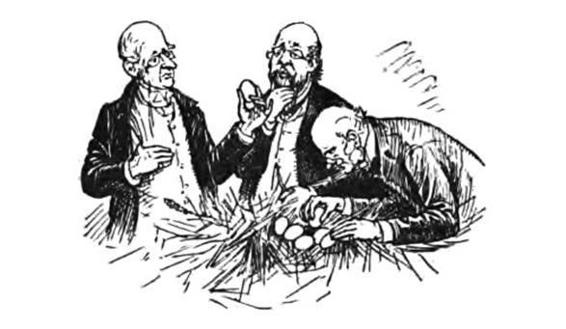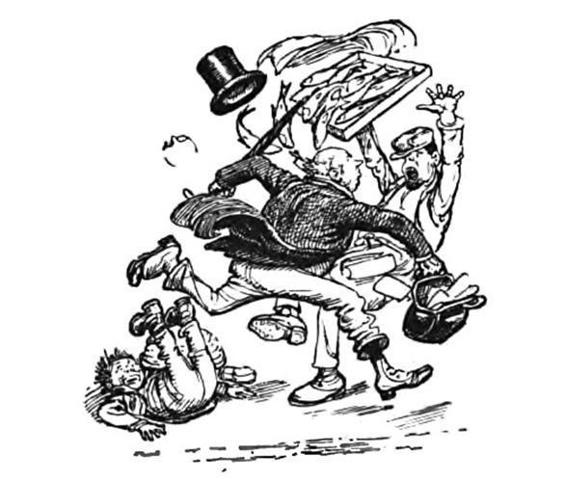Delphi Complete Works of Jerome K. Jerome (Illustrated) (Series Four) (385 page)
Read Delphi Complete Works of Jerome K. Jerome (Illustrated) (Series Four) Online
Authors: Jerome K. Jerome

They suggested the idea to the critics, and the critics thought it an excellent one, and said they would undertake the job with pleasure. One must say for the critics that they never shirk work. They will sit and criticise for eighteen hours a day, if necessary, or even, if quite unnecessary, for the matter of that. You can’t give them too much to criticise. They will criticise everything and everybody in this world. They will criticise everything in the next world, too, when they get there. I expect poor old Pluto has a lively time with them all, as it is.

So, when a man built a house, or a farm-yard hen laid an egg, the critics were asked in to comment on it. They found that none of the houses were original. On every floor were passages that seemed mere copies from passages in other houses. They were all built on the same hackneyed plan; cellars underneath, ground floor level with the street, attic at the top. No originality anywhere!
So, likewise with the eggs. Every egg suggested reminiscences of other eggs.
It was heartrending work.
The critics criticised all things. When a young couple fell in love, they each, before thinking of marriage, called upon the critics for a criticism of the other one.
Needless to say that, in the result, no marriage ever came of it.
“My dear young lady,” the critics would say, after the inspection had taken place, “I can discover nothing new whatever about the young man. You would simply be wasting your time in marrying him.”
Or, to the young man, it would be:
“Oh, dear, no! Nothing attractive about the girl at all. Who on earth gave you that notion? Simply a lovely face and figure, angelic disposition, beautiful mind, stanch heart, noble character. Why, there must have been nearly a dozen such girls born into the world since its creation. You would be only wasting your time loving her.”
They criticised the birds for their hackneyed style of singing, and the flowers for their hackneyed scents and colours. They complained of the weather that it lacked originality — (true, they had not lived out an English spring) — and found fault with the Sun because of the sameness of his methods.
They criticised the babies. When a fresh infant was published in a house, the critics would call in a body to pass their judgment upon it, and the young mother would bring it down for them to sample.
“Did you ever see a child anything like that in this world before?” she would say, holding it out to them. “Isn’t it a wonderful baby?
You
never saw a child with legs like that, I know. Nurse says he’s the most extraordinary baby she ever attended. Bless him!”
But the critics did not think anything of it.
“Tut, tut,” they would reply, “there is nothing extraordinary about that child — no originality whatever. Why, it’s exactly like every other baby — bald head, red face, big mouth, and stumpy nose. Why, that’s only a weak imitation of the baby next door. It’s a plagiarism, that’s what that child is. You’ve been wasting your time, madam. If you can’t do anything more original than that, we should advise you to give up the business altogether.”
That was the end of criticism in that strange land.
“Oh! look here, we’ve had enough of you and your originality,” said the people to the critics, after that. “Why,
you
are not original, when one comes to think of it, and your criticisms are not original. You’ve all of you been saying exactly the same thing ever since the time of Solomon. We are going to drown you and have a little peace.”
“What, drown a critic!” cried the critics, “never heard of such a monstrous proceeding in our lives!”
“No, we flatter ourselves it is an original idea,” replied the public, brutally. “You ought to be charmed with it. Out you come!”
So they took the critics out and drowned them, and then passed a short act, making criticism a capital offense.
After that, the art and literature of the country followed, somewhat, the methods of the quaint and curious school, but the land, notwithstanding, was a much more cheerful place to live in, I dreamed.
But I never finished telling you about the dream in which I thought I left my legs behind me when I went into a certain theatre.
I dreamed that the ticket the man gave me for my legs was No. 19, and I was worried all through the performance for fear No. 61 should get hold of them, and leave me his instead. Mine are rather a fine pair of legs, and I am, I confess, a little proud of them — at all events, I prefer them to anybody else’s. Besides, number sixty-one’s might be a skinny pair, and not fit me.
It quite spoilt my evening, fretting about this.
Another extraordinary dream I had was one in which I dreamed that I was engaged to be married to my Aunt Jane. That was not, however, the extraordinary part of it; I have often known people to dream things like that. I knew a man who once dreamed that he was actually married to his own mother-in-law! He told me that never in his life had he loved the alarm clock with more deep and grateful tenderness than he did that morning. The dream almost reconciled him to being married to his real wife. They lived quite happily together for a few days, after that dream.
No; the extraordinary part of my dream was, that I knew it was a dream. “What on earth will uncle say to this engagement?” I thought to myself, in my dream. “There’s bound to be a row about it. We shall have a deal of trouble with uncle, I feel sure.” And this thought quite troubled me until the sweet reflection came: “Ah! well, it’s only a dream.”
And I made up my mind that I would wake up as soon as uncle found out about the engagement, and leave him and Aunt Jane to fight the matter out between themselves.

It is a very great comfort, when the dream grows troubled and alarming, to feel that it is only a dream, and to know that we shall awake soon and be none the worse for it. We can dream out the foolish perplexity with a smile then.
Sometimes the dream of life grows strangely troubled and perplexing, and then he who meets dismay the bravest is he who feels that the fretful play is but a dream — a brief, uneasy dream of three score years and ten, or thereabouts, from which, in a little while, he will awake — at least, he dreams so.
How dull, how impossible life would be without dreams — waking dreams, I mean — the dreams that we call “castles in the air,” built by the kindly hands of Hope! Were it not for the mirage of the oasis, drawing his footsteps ever onward, the weary traveler would lie down in the desert sand and die. It is the mirage of distant success, of happiness that, like the bunch of carrots fastened an inch beyond the donkey’s nose, seems always just within our reach, if only we will gallop fast enough, that makes us run so eagerly along the road of Life.
Providence, like a father with a tired child, lures us ever along the way with tales and promises, until, at the frowning gate that ends the road, we shrink back, frightened. Then, promises still more sweet he stoops and whispers in our ear, and timid yet partly reassured, and trying to hide our fears, we gather up all that is left of our little stock of hope and, trusting yet half afraid, push out our groping feet into the darkness.
CLOCKS
THERE are two kinds of clocks. There is the clock that is always wrong, and that knows it is wrong, and glories in it; and there is the clock that is always right — except when you rely upon it, and then it is more wrong than you would think a clock
could
be in a civilized country.
I remember a clock of this latter type, that we had in the house when I was a boy, routing us all up at three o’clock one winter’s morning. We had finished breakfast at ten minutes to four, and I got to school a little after five, and sat down on the step outside and cried, because I thought the world had come to an end; everything was so death-like!

The man who can live in the same house with one of these clocks, and not endanger his chance of heaven about once a month by standing up and telling it what he thinks of it, is either a dangerous rival to that old established firm, Job, or else he does not know enough bad language to make it worth his while to start saying anything at all.
The great dream of its life is to lure you on into trying to catch a train by it. For weeks and weeks it will keep the most perfect time. If there were any difference in time between that clock and the sun, you would be convinced it was the sun, not the clock, that wanted seeing to. You feel that if that clock happened to get a quarter of a second fast, or the eighth of an instant slow, it would break its heart and die.
It is in this spirit of child-like faith in its integrity that, one morning, you gather your family around you in the passage, kiss your children, and afterward wipe your jammy mouth, poke your finger in the baby’s eye, promise not to forget to order the coals, wave at last fond adieu with the umbrella, and depart for the railway-station.

I never have been quite able to decide, myself, which is the more irritating: to run two miles at the top of your speed, and then to find, when you reach the station, that you are three-quarters of an hour too early; or to stroll along leisurely the whole way, and dawdle about outside the booking-office, talking to some local idiot, and then to swagger carelessly on to the platform, just in time to see the train go out!

